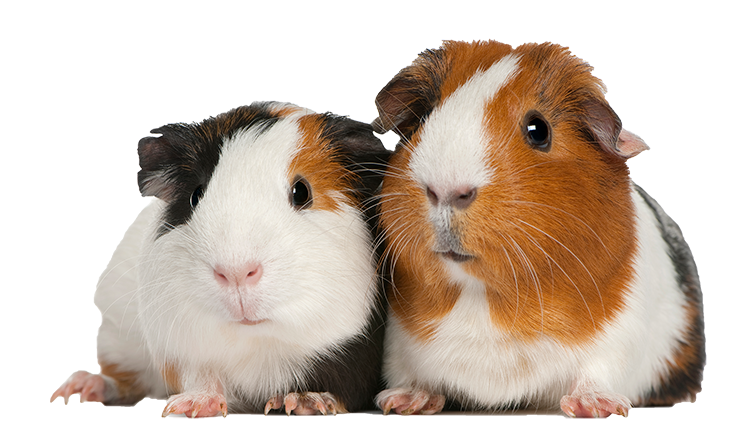All guinea pigs should be examined
ANNUALLY
by a veterinarian. Please monitor your pet and call us if you have any concerns. Some signs that will require a veterinary visit include: eating less or not eating at all, defecating less or not passing feces at all, and appearing uncomfortable, hunched, or quieter than normal.

Some of the most important pieces of making sure guinea pig is well taken care of include:
Grass hay diet
Fresh vegetable diet
Daily vitamin C supplementation
Well ventilated caging with solid flooring
Clean the cage regularly
Guinea pig Care Instructions
In general, we recommend the following diet for guinea pigs:
- Unlimited access to grass hay, such as timothy, orchard, or meadow. Oxbow is a great brand.
- Alfalfa hay should only be fed to juvenile pigs, as the high calcium content can predispose the adults to forming urinary bladder stones.
- 1/8 cup of good quality timothy-hay based pellets per day (adult guinea pig). Oxbow is a great brand.
- 1 cup of fresh vegetables per day. Excellent choices of vegetables include bell peppers, kale, strawberries, oranges, kiwi, snow peas, tomatoes, zucchini, cucumber, arugula, endive, escarole, chard, parsley, mustard greens, dandelion greens, carrot tops, mint, basil, and bok choy. Very small amounts of fruit (no more than 1 tablespoon/day) can be offered. Be sure to introduce new foods slowly and rotate often! Salad Spring mixes from the grocery store offer a good variety of greens.
- Avoid giving too much broccoli, brussel sprouts, collards, kale, mustard greens, spinach, swiss chard, and parsley. These food items contain a lot of calcium and can predispose your piglet to forming urinary stones in the bladder.
- Seeds, nuts, and grains are not recommended.
- Vitamin C: Guinea pigs require vitamin C daily supplementation. Vitamin C can be provided by offering a good quality guinea pig pellet (e.g. Oxbow) and vegetables rich in Vitamin C, such as bell peppers, kale, strawberries, oranges, kiwi, snow peas, and tomatoes. If you are providing a good diet, as described above, there is no need to give your pet any other source of Vitamin C. If you are not able to provide fresh vegetables and fruits rich in Vitamin C daily, we recommend offering one tablet of Oxbow Vitamin C. Human vitamins diluted in water are not recommended.
- Guinea pigs are crepuscular (active at dawn and dusk) but can also adapt to your schedule.
- Caging should be well ventilated with solid flooring. Be sure to provide visual security in the form of a hide box (one hide box per animal).
- The enclosure size for two guinea pigs should be at least 120 x 60 x 50 cm or 50 x 24 x 20 in (length x width x height). Increase the base area by at least 20% for each additional pig is necessary (1 m2 or 10 sq ft per animal is ideal).
- Paper based absorbent bedding, such as Care Fresh, is recommended. A full cage cleaning should be done once weekly to remove soiled bedding. AVOID pine, cedar, and aspen bedding.
- Clean, check and change water bottles frequently.
- Clinically normal rabbits harbor a variety of bacterial organisms that can cause death and disease in guinea pigs. Never house guinea pigs and other rodents near rabbits.
- Guinea pigs are highly social animalsthat should never be housed alone. Pairs, trios, harems (1 boar and 1-10 sows) as well as single-sex groups can life together peacefully.
- Guinea pigs do well at an ambient room temperature of 65-79°
Intact female guinea pigs are very prone to developing ovarian cysts. The incidence of these cysts in intact guinea pigs has been identified to be between 65-75%! They most commonly develop the cysts between 2 and 4 years of age. The cysts can be very large and cause a lot of discomfort and pain, as well as anorexia, weakness, depression, and depending on the type of cyst hair loss on the flanks. The treatment of choice is surgical removal of the reproductive tract (spay), including the cysts. However, due to the cyst size, this surgery is not as simple as a regular preventive spay. Spaying your friend between 3 to 5 months of age is the best option to avoid this problem. Consult your veterinarian for more information and options.
Guinea pigs are considered sexually mature at 2 months and 3 months of age respectively for females and males. Please keep males and females separated beginning at 2 months of age to avoid accidental birth of litters.
Rodents have sensitive respiratory tracks and are prone to developing upper respiratory infections. Avoid pine, cedar, and aspen bedding substrates. Cleaning the cage regularly and removing soiled bedding will help reduce the ammonia smell from their urine. Do not use scented products, heavily scented cleaners, candles, incense, aromatic diffusers/essential oils, or aerosol sprays around or near them! Even when disinfecting their enclosure and food bowls, make sure it’s completely aired out before replacing your pigs into their enclosures.
Rodents have continuing growing teeth throughout their lifetime. They depend on the rough forage of the hay and chew toys to help wear down their teeth and prevent overgrowth. They have front incisors and back molars. If your guinea pig is losing weight, is having trouble eating, or is defecating less, these are signs it is sick and needs to see a veterinarian.
An exotics veterinarian, who can evaluate their teeth for signs of overgrowth, should evaluate your guinea pigs once a year. There are no vaccines that guinea pigs require.



